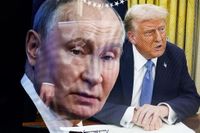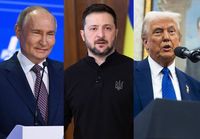Ukrainian President Volodymyr Zelensky urged European leaders on March 20, 2025, to maintain their firm stance against Russian President Vladimir Putin in light of impending peace negotiations aimed at achieving a limited truce. Speaking at a press conference in Oslo, Zelensky emphasized the crucial need for continued military support and sanctions against Russia, stating, "I understand it this way: there will be a meeting between Ukraine and the United States, and then our American partners told us that there would be a diplomatic shuttle and a meeting between the United States and Russia," reported by France24.
The call came just days before the United States is set to open concurrent discussions in Saudi Arabia with both Moscow and Kyiv on March 24, 2025, specifically designed to push towards a short-term ceasefire in the ongoing conflict. Meanwhile, Russia has confirmed the initiation of its own discussions, cementing the significance of these dialogues amidst ongoing hostilities.
In addition to diplomatic efforts, Zelensky addressed a recent escalation of violence, highlighting a massive drone assault executed by Russia just the night before. The attack involved 171 drones targeting critical infrastructure across Ukraine. "Nothing has changed," he declared in a video message to European leaders, underscoring the urgency and gravity of the situation.
Across the Atlantic, U.S. President Donald Trump aims to secure a general ceasefire of 30 days, a prerequisite he insists is necessary before any further negotiations can occur. Following the telephone conversation involving Trump and Putin, which extended over two hours, the framework for this temporary truce was outlined. Kirill Dmitriev, an advisor to Putin, quipped, "The world has become much safer today", reflecting a hopeful tone from the Russian side regarding the potential for peace.
Amidst these complex negotiations, British Prime Minister Keir Starmer has emerged as a key player advocating for the coalition of nations committed to supporting Ukraine. Following a meeting of military chiefs from over 25 countries, which took place in London, Starmer reassured allies that plans are indeed forming to defend a possible ceasefire. He remarked, as reported by various news outlets, on the necessity of establishing a coalition of willing countries to bolster Ukraine's defenses.
Starmer's aspirations are echoed by EU Foreign Affairs Chief Kaja Kallas, who has proposed a significant military assistance plan that would provide Ukraine with around two million artillery shells, funded by approximately five billion euros. Zelensky has called on European allies to approve this initiative, ensuring supply chains stay robust as the conflict endures.
Moreover, Trump has suggested that the U.S. should gain control of Ukrainian nuclear facilities to safeguard their security, a proposal that drew a stern retort from Zelensky, who insisted, "We will not negotiate over our power plants; they belong to Ukraine." This heated exchange signals a continued tension in U.S.-Ukrainian relations, despite Trump’s previous characterization of their conversation as "fantastic".
The interplay of international diplomacy also includes discussions surrounding Ukraine's aspirations to join NATO, previously a contentious subject under the shadow of Russian aggression. Both Trump and Putin have recognized that controlling the discourse about NATO membership will be vital in the framework of future negotiations.
As the situation unfolds, Zelensky has been vocal in his determination to uphold sanctions against Russia, stating they should not be lifted until Russian troops begin their withdrawal from Ukrainian territory. He insisted, "It is essential that your support for Ukraine does not diminish but rather continues and increases, especially for our air defense systems," highlighting the critical military needs of Ukraine.
In conclusion, the coming days promise to be pivotal as Ukraine prepares for the scheduled talks in Saudi Arabia, with a fragile hope for peace juxtaposed against the backdrop of ongoing military aggression. The complexities of diplomacy, military aid, and international coalition-building will determine the trajectory of the conflict as Zelensky implores allies not to relent in their support.


